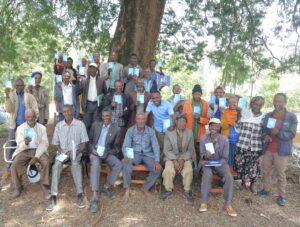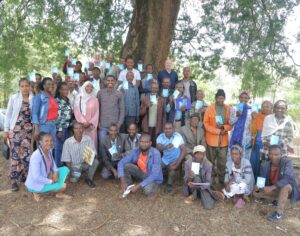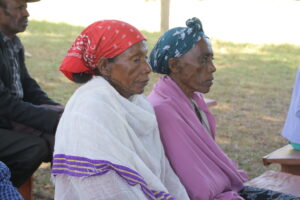COWASH IV, a project committed to long-term WASH (Water, Sanitation and Hygiene) sustainability in rural Ethiopia, recently held discussions with key stakeholders to explore the potential of existing WASH Saving and Loan Associations (SLAs) evolving into Rural Savings and Credit Cooperatives (RWSCCs).
The field visit conducted in Yem Zone Central Ethiopia from 19-20 March 2024 focused on strengthening the established WASH SLAs. Previously, COWASH IV facilitated the establishment of five WASH SLAs in Wegencho Kebele at the end of EFY 2014. These groups, with a total of 152 member households, received essential training and successfully achieved their initial goal of constructing improved household latrines with functional handwashing facilities for all members.
Looking Towards Empowering Communities Through Financial Independence:
With the initial objective accomplished, COWASH IV and WASH SLA leaders are setting their sights on the future. Recent discussions involved Zonal and Woreda level officials, cooperative development experts, and WASH SLA leaders. The central theme of these discussions was the potential for WASH SLAs to transform into formal RWSCCs.
This transition holds significant promise, particularly for WASH SLA members who aspire to improve their WASH facilities, especially piped household water access, which is often hindered by financial constraints.
RWSCCs: A Promising Path to WASH Sustainability:
RWSCCs offer and foster financial services and independence for WASH SLA members, which empowers them to collectively save and pool resources for WASH infrastructure projects like household piped water systems. It will also enable them to manage their WASH needs autonomously, achieving long-term sustainability. Beyond empowering existing members, RWSCCs can facilitate access to credit for sanitation and hygiene improvements or even establish market-based sanitation businesses within the community.
This initiative has the potential to establish the first WASH RWSCCs in Ethiopia, serving as a model for other communities seeking WASH sustainability. The discussions highlighted the potential of this initiative and the willingness of local stakeholders to collaborate. COWASH IV FTAT plays a key role in facilitating these discussions and exploring the possibilities.
With 60 successful WASH SLAs established in Amhara, Central, Oromia, and Sidama regions, COWASH IV’s commitment to empowering communities is clear. Their focus on developing RWSCCs represents the next step toward long-term WASH sustainability. By supporting these initiatives, COWASH IV is paving the way for a future where communities can effectively manage their own WASH needs and build a healthier future.









